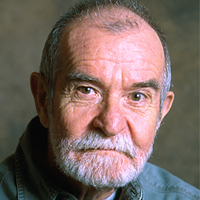Racism in "Master Harold"... and the Boys
As the title of the play suggests Master Harold and the boys is a play that deals with the problems created by racism. Flatly, a white boy is presented as a master and the black characters are called boys. The title is hierarchy, creating where the white boy is superior and privileged and the boys that are the black characters like Sam and Willie are subordinate and underprivileged.

Athol Fugard (11 June 1932)
Though the white boy Hally and black characters Sam and Willie behave as friends, in moments of distress the white boy falls into the racist trap as conditioned by his socio-cultural training. When this racial hatred externalizes itself all bonds based on natural human impulse and friendships get dismantled.
Hally's father is not at home and in the actual performance, he doesn't appear on the stage. In his absence, Sam works as Hally's surrogate father. Sam is his friend, father, teacher and a moral guide. There is a good relationship between them .They work together and Sam teaches Hally many things. It is the natural human instincts and impulses that determine their relationship. There is mutual caring and sharing. They fly kites together and are happy in each other's company. Hally also respects Sam and in return he gets many things from Sam. As individual human beings there are no problems that constrain their relationship. Love, kindness, understanding, respect- all of these are there in the world of their friendship. They are delighted to explore major ethical issues together. It highlights their respect and deep affection for each other. Willie is also like Hally's older brother. It is a harmonious world of friendship.
Once Hally has a long conversation with his mother who is taking care of her husband at the hospital. The telephone sound is a harbinger of trouble. It symbolically stands for his father who represents the racist white community. Hally is reminded of his drunkard and diseased father. He feels psychologically disturbed as he feels inferior and humiliated at the thought of his father's condition. Sam tries to sympathize with Hally and offers some comfort. Hally suffers from a deep rooted psychological and cultural problem. He doesn't like a black man consoling him. It is at this crucial moment in the play when HaIly's racial and cultural training that had shaped him makes itself manifest. His anger, fear and frustration are poured out on Sam. To cover his feelings of humiliation and inadequacies brought about by his father's condition he spits Sam in the face after giving him orders. He asks Sam to call him a master. All bonds of friendship are fast falling. Hally no longer behaves like a friend with natural human impulses: He has fallen into the racist trap. The training he had got in the family and the society has conditioned his response. He is no longer Sam's friend and disciple, but a white master for whom Sam works. The problem in their relationship doesn't lie in their individual characters, but has to do with larger social and cultural issues related to racism. Thus, the play is not about the individual problems of characters, but a problem of racism.
